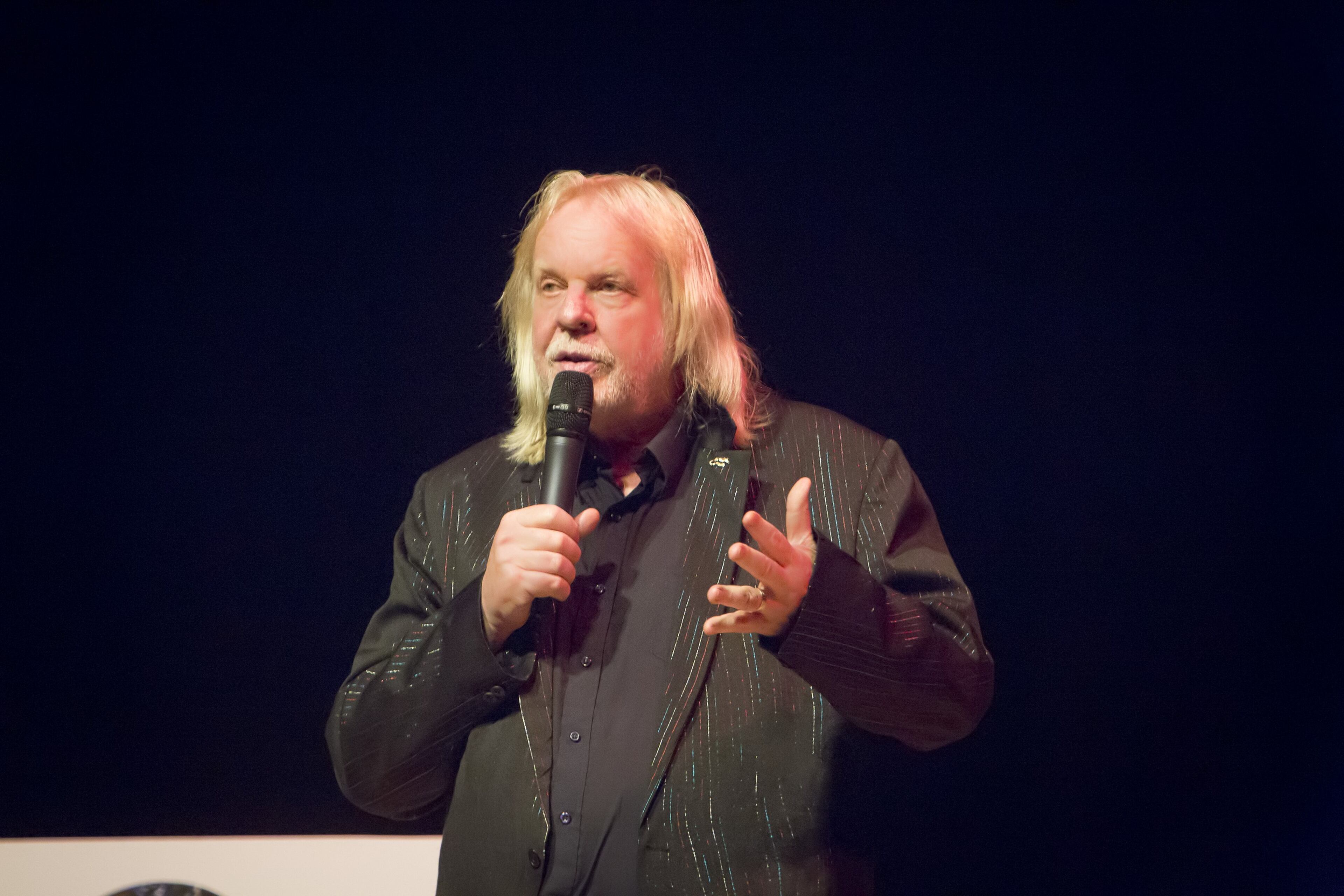Rick Wakeman: keyboard genius from Yes, prog rock’s grumpy old man

While keyboard master Rick Wakeman regularly appears on television and radio in the U.K., he was, until recently, not generally known in the U.S. for stand-up comedy.
That changed in 2017, during the Rock and Roll Hall of Fame induction speech for his band Yes.
Wakeman eschewed the long list of thank-yous and instead joked about prostate exams, sexual dysfunction and marital bliss. He reminisced about his first meaningful sexual experience, which had taken place “not half a mile away from here. It wasn’t very good. It never is, when you’re on your own.”
The audience went nuts, though some of his bandmates weren’t pleased. Wakeman decided to break up the tedium, he said, egged on by fellow Yes-men Jon Anderson and Trevor Rabin. “How many times can somebody stand up and thank their brother, their uncle, their mother, their father, the man who lived down the road?” he said, in a recent Zoom call from his Suffolk County home in the English countryside. “It’s so incredibly boring.”

Back in the 1970s Wakeman adopted an ethereal manner as the keyboard whiz in Yes, with his elbow-length mane of white-blond hair and his sparkly capes. But behind the Gandalfian appearance was an earthy sense of humor and a skill at extemporizing, which kept life anything but boring.
That skill will be in play during a solo appearance March 9 at the Variety Playhouse, which will be equal measures of piano and both ribald and touching stories.
Postponed since last fall, the show is a return to a format he presented with success in 2019, the “Grumpy Old Rock Star Tour,” except that now he’s even grumpier and, at 72, older.
The extemporizing skill was, in a way, key to the beginning of his career.
In a 1969 London recording session with a soul band called Junior’s Eyes, Wakeman spotted a Mellotron in the corner of the studio and asked producer Tony Visconti if he could fool around with it during a break.
Because of its mechanical design, the 122-pound machine, with three dozen continuously rotating tape machine playback heads, was notoriously impossible to play in tune.
But Wakeman found a “cheat,” he said. Visconti was impressed, and invited Wakeman to come back a few weeks later to play the Mellotron on a newcomer’s experimental single called “Space Oddity.” Thus began a fruitful partnership with David Bowie.
A year later Bowie wanted Wakeman to join his band, but the keyboardist joined Yes instead. While he has since joined and left the prog-rock supergroup several times, his keyboards contributed to the band’s most storied phase, from 1971 to 1974, and the classic albums “Fragile,” “Close to the Edge” and “Tales from Topographic Oceans.”
Yes made progressively more and more elaborate recordings, with longer songs on each album, until 1973′s “Tales,” a two-record set with four side-length songs.
Wakeman became dissatisfied with the excess, and the ensuing five-month tour, during which the entire album was performed live. In the meantime, his solo project, “The Six Wives of Henry the VIII,” did well.
In 1974 he left Yes, and pursued his own muse, which was not exactly restrained.
That year he recorded “Journey to the Centre of the Earth,” live, at London’s Royal Festival Hall, employing the London Symphony Orchestra, the English Chamber Choir, a narrator and a five-piece band.
There was excess in his personal life as well, which led to a heart attack. “I was, believe me, burning the candle at both ends,” he said, “musically, work-wise, drink-wise, and everything. So a lot of it was my own fault. But 1974 was certainly a pivotal year for me, in many respects, both good and bad, as you mention.”
Wakeman added, “I’ve stopped having the heart attacks, because they hurt.”
His next work, “The Myths and Legends of King Arthur and the Knights of the Round Table,” was performed with equally elaborate musical forces, and even led to a somewhat comical experiment in which he arranged the music for a performance on ice.
Wakeman remained prolific and experimental, writing movie soundtracks, a ballet score, putting out New Age solo piano records, teaming up with Bowie again and rejoining and leaving several different reboots of Yes.
There was a period during 2018 when two competing versions of Yes were touring simultaneously. Wakeman told the San Diego Union-Tribune that the band was, by that point, “Spinal Tap in every sense” and that the road crew “look at their jobs as nurturing a bunch of senior citizens and it’s almost a minor miracle to them when we walk on stage unaided.”
Today Wakeman, named a Commander of the British Empire by Queen Elizabeth, lives a quieter life in Suffolk, with his fourth wife Rachel Kaufman. (Wakeman jokes that he has married almost as many times as Henry.) Our phone call was interrupted only when one of his rescue animals “decided they were going to destroy something. We’ve got six rescues here, and I suppose seven, if you include me,” he said.
The current tour was delayed due to concerns about COVID-19, and those concerns remain top of mind. “I’ve lost 19 friends, and that really brings it home to you,” he said.
“The killer was not being able to play. It’s all very well playing the piano every day, which I do, but it’s not the same as going on stage and being part of an audience, and playing to people. You don’t get match-fit. I missed it terribly. I’m looking forward to coming out, but I will be sensible.”
CONCERT PREVIEW
Rick Wakeman’s “The Even Grumpier Old Rock Star Tour,” 8 p.m., Wednesday, March 9; $39.50-$79.50; Variety Playhouse, 1099 Euclid Ave., variety-playhouse.com


